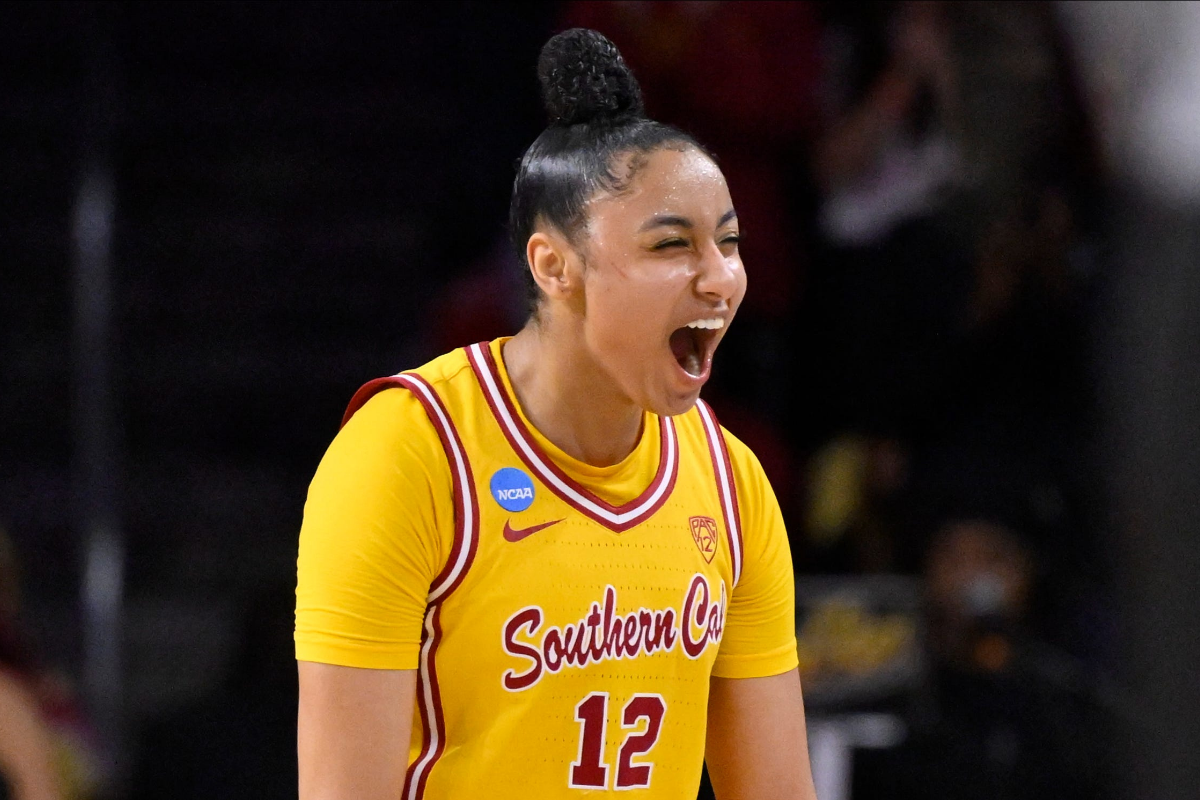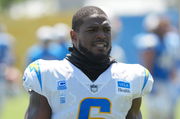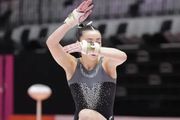
Imago
USC Trojans guard JuJu Watkins (12) celebrates during a NCAA Women’s Tournament 2nd round game against the Kansas Jayhawks at Galen Center.

Imago
USC Trojans guard JuJu Watkins (12) celebrates during a NCAA Women’s Tournament 2nd round game against the Kansas Jayhawks at Galen Center.
It’s hard to ignore the name JuJu Watkins these days. Her performances on college basketball courts even grabbed the attention of NBA legends such as Magic Johnson. But for those who have been fans of the 6-foot-2 USC Trojans player, it’s easy to forget how her formative years weren’t always filled with basketballs and courts. In fact, it began with a passion for the sport that was quite unlikely. Picking up the basketball at the age of seven, her love for the game began to grow and became something she could not separate herself from.
Watch What’s Trending Now!
From competing in local park leagues to being crowned The Athletic’s National Player of the Year, undeniable success represents JuJu’s route to the Hall of Fame. So, what did her parents do to mold the extraordinary athlete? Let’s take a closer look at the forces behind JuJu’s success story.
ADVERTISEMENT
Who is JuJu Watkins’ father, Robert Neal-Watkins?
Behind every great player is likely a parent or mentor who supports them during their journey. For JuJu, that’s her father, Robert Neal-Watkins, and his impact on her career in basketball goes beyond the stands—he was her first coach, biggest cheerleader, and most influential figure in building her skills. “When we started in the backyard, it was always about the foundation and the repetition,” Robert said. “We were always making sure we were adding to her value and her skillset. The one great thing about JuJu was whatever we worked on in the backyard she would implement immediately in the game, and she wasn’t afraid of taking risks.”
Robert was always around sports growing up. During his college days, Robert was also a college athlete who played football. For Robert, his athletic background made it easier to connect with JuJu during her development. As a full-time real estate agent working out of Los Angeles, Robert had plenty on his plate, but his dedication to his daughter’s development never wavered. Alongside his wife, Sari Watkins, Robert has raised a closely knit family with four children, with JuJu being his youngest. His love of the game, coaching approach and athletic background all played major roles in JuJu’s early basketball career.
Top Stories
NFL Suspends Chargers’ Denzel Perryman for Two Games Over Cowboys Incident

Clark Hunt Admits Being Pressured to Leave Arrowhead After Chiefs Offered $2.4B Proposal

American Gymnastics Coaches Tied to Training Olympians Face Suspensions

Steelers Confirm $45M Punishment for DK Metcalf After NFL Suspended WR for 2-Games

Sean McDermott Confirms if Bills Will Sign a QB Amid Josh Allen’s Injury Concerns

FOX Earns Rare Moment of Respect as NFL Honors NASCAR Legend Live on Air

ADVERTISEMENT
Who is JuJu Watkins’ mother, Sari Watkins?
On the flip side, JuJu’s mother, Sari Watkins, has been equally as important in defining her daughter’s trajectory. A former college track and field athlete, Sari has plenty of experience with what it takes to succeed as a college athlete. And based on that experience, she’s set an emphasis on qualities like hard work, commitment, and family as hallmarks of JuJu’s approach to hoops.

Imago
Dec 29, 2024; Los Angeles, California, USA; Southern California Trojans guard JuJu Watkins (12) reacts against the Michigan Wolverines in the first half at Galen Center. Mandatory Credit: Kirby Lee-Imagn Images
Interestingly, when JuJu was younger, basketball wasn’t the plan her parents had in mind for her. Sari and Robert had hoped she would follow in the footsteps of Venus and Serena Williams and pursue tennis. But when JuJu made it clear that her heart was in basketball, Sari offered her some important advice. “Don’t do nothing if you’re not going to be fully in it,” Sari told her daughter, a piece of wisdom that has clearly stuck with JuJu throughout her career.
ADVERTISEMENT
Even with her schedule, Sari rarely misses a JuJu game and will be cheering in the stands on game-day. One of the sweetest rituals Sari is known for is making JuJu’s trademark hair bun before each game. When asked what the secret behind the iconic bun was — Sari laughed in an interview: “The secret behind the bun is don’t tell the secret behind the bun,” she said playfully showing just how much love and support Sari gives to JuJu off the field.
ADVERTISEMENT
What is the family legacy of JuJu Watkins’ parents?
The Watkins family’s history stretches well beyond basketball and into the world of community activism and social justice in South Los Angeles. JuJu’s great-grandfather, Theodore “Ted” Watkins Sr., was a civil rights leader who, founded the Watts Labor Community Action Committee (WLCAC) in the aftermath of the Watts Riots of 1965. The organization was critical in helping the neighborhood during a fraught part of Los Angeles history and continues to serve the community to this day.
Such is Ted Watkins Sr.’s impact on the community, there is a park that bears his name — Ted Watkins Memorial Park. Fittingly, it’s the very park and playground JuJu practiced on as a child.
JuJu’s grandfather, Tim Watkins, carried on the family’s legacy of activism and community service. He assumed leadership of the WLCAC after his father’s death, maintaining the family’s deep roots in social justice work in Watts. That commitment to service, education and community development has helped mold JuJu into the person she is. “JuJu’s childhood is not very typical so we try our best to make sure she doesn’t get overwhelmed with everything,” her mother Sari said.
The Watkins family has given JuJu an awareness of ambition and humility, taking care that she remains grounded amid skyrocketing fame. As JuJu continues to play this next chapter of college basketball, the legacy of her family’s activism and the help they provided her will live on, both on and off the court.
ADVERTISEMENT
ADVERTISEMENT
ADVERTISEMENT
ADVERTISEMENT

